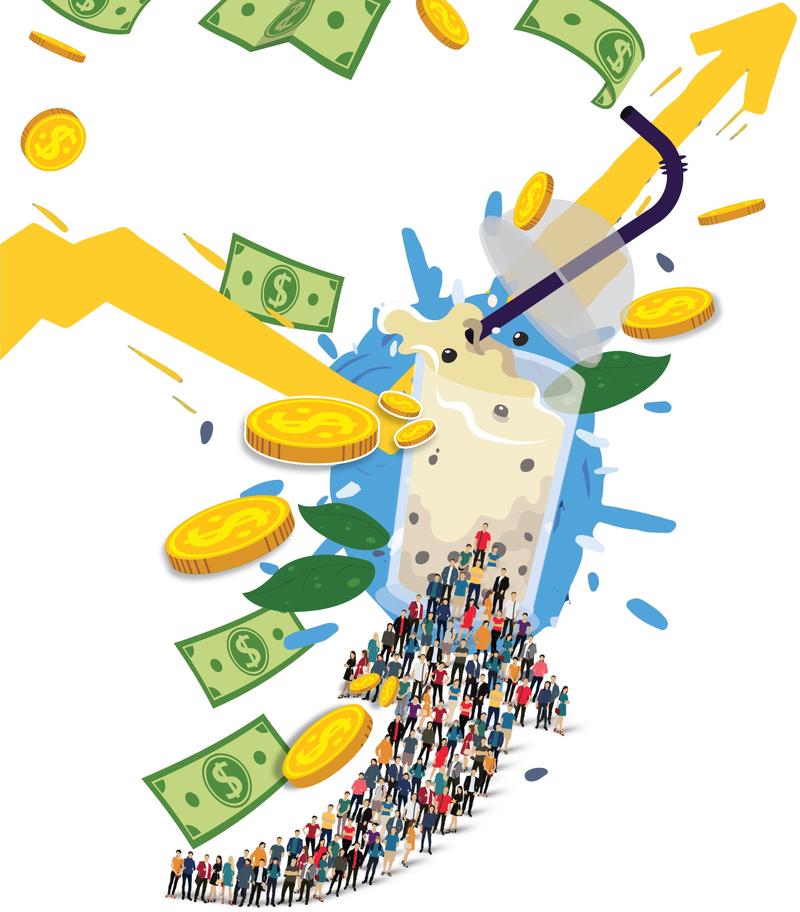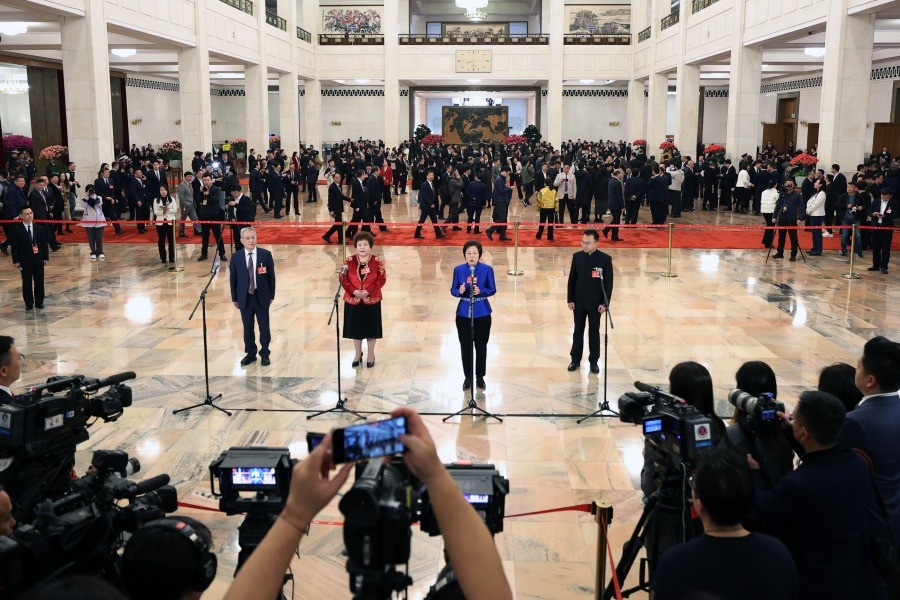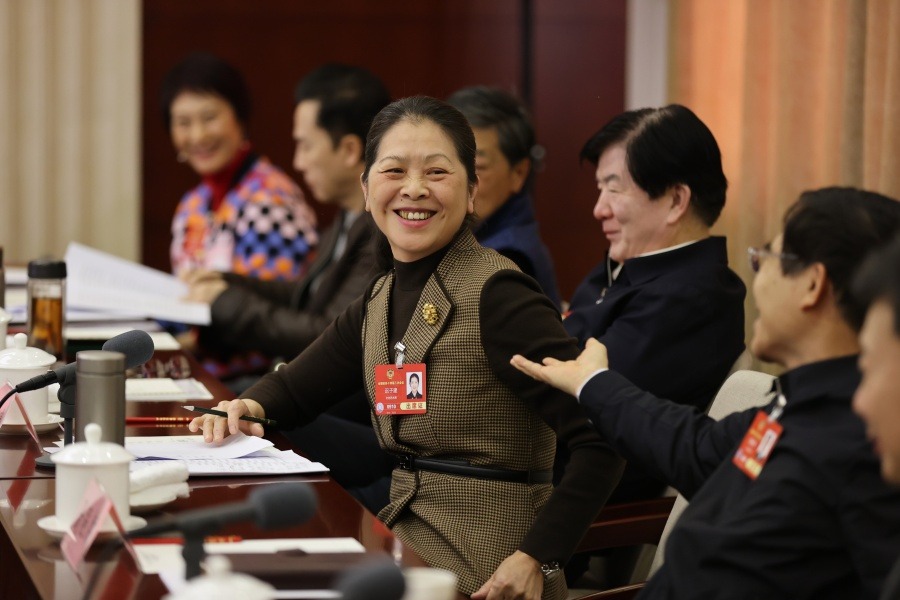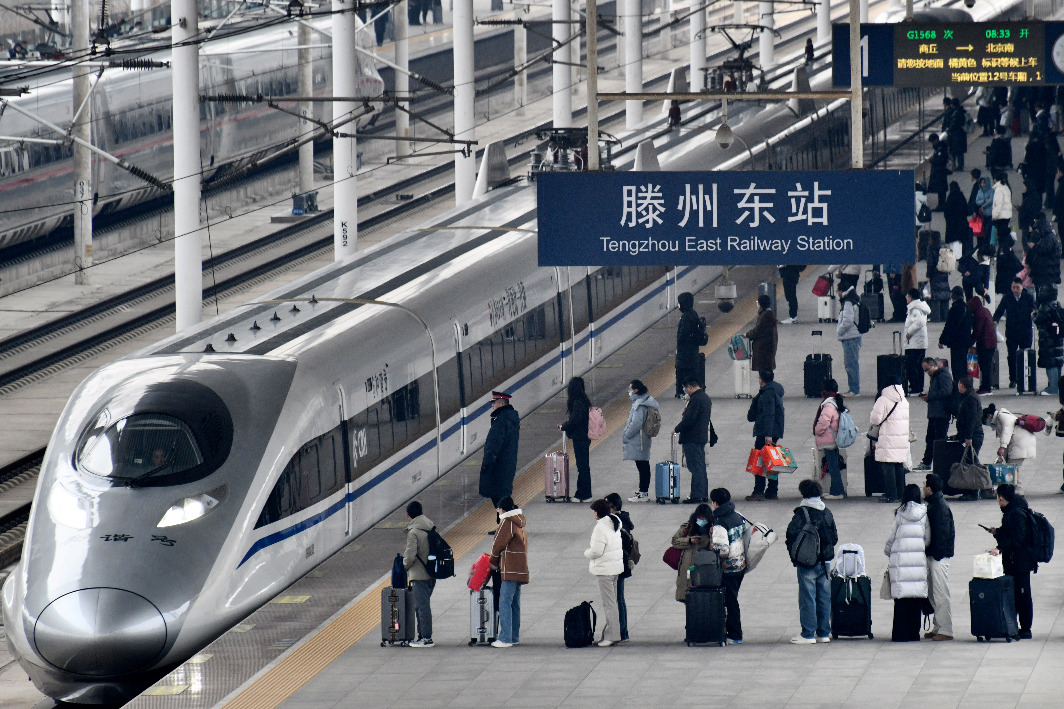Tea tales say it all

With COVID-19 gradually easing off, consumption power is regaining momentum. But industry experts say a full recovery is still a ways off. Zeng Xinlan reports from Hong Kong.

Would you wait six hours just for a cup of milk tea? Most people wouldn't, but young, urban consumers in the long lines outside a popular pop-up store in Shenzhen chose otherwise.
Sexy Tea, better known by its Chinese name, Chayan Yuese — a viral tea brand hailing from Changsha, the capital of Central China's Hunan province — picked Shenzhen for its first pop-up store in the Chinese mainland's top-tier cities. The reception was phenomenal, drawing tens of thousands of customers who waited in line for up to six hours to get their cups of tea, much to the displeasure of the local traffic police.
A cup of Orchid Latte — the store's signature milk tea priced at 16 yuan (US$2.50), with a black tea base and whipped cream and topped with roasted pecans — was even at the mercy of scalpers, who resold it for more than 200 yuan. "With that much time and money spent on getting it, you might as well take the high-speed train to Changsha instead," a netizen on Weibo wrote.
As the economy rebounds along with the warm weather, having a drink of milk tea has become the in-thing among avid, social media-savvy consumers. Mainland residents in March purchased an average of two or more cups of the beverage at brick-and-mortar stores and 1.5 more cups from online platforms compared with the number in February, according to the Alipay Spring Milk Tea Report.
Hong Kong shares the mainland's milk tea craze. And the comeback of milk tea in the special administrative region tells a bigger story, as it is part and parcel of the city's 7.9 percent year-on-year increase in GDP in the first quarter. Economic growth was up 5.4 percent from the previous quarter.
"Our business had gone up by some 30 percent in the first quarter of this year, compared to the fourth quarter of 2020," said Daniel Wong, marketing manager of Chicha San Chen, a Taiwan milk-tea brand that opened its first store in the SAR in October 2019. He attributed the growth to the early advent of summer, lower retail store rentals, and improved consumer sentiment as the pandemic tapers off.
"Young people are less worried about COVID-19 now," Wong said. "Night-time consumption is rising as Hong Kong people are more willing to stay out late for shopping compared to the last quarter," he said, adding that consumers linger on the streets much longer compared with a few months ago.
The Hong Kong Observatory issued its first "very hot weather" warning for this year early last month. "The hot weather has boosted our milk tea business", said Wong, anticipating the business will continue to benefit from the summer season. "I expect our business to grow by 50 to 60 percent this year compared to last year's."
With lower store rentals, the new-style tea brand plans to open its second brick-and-mortar store in one of Hong Kong's prime commercial districts, such as Tsim Sha Tsui and Causeway Bay. "Shops rents have dropped significantly by up to 60 percent in Causeway Bay," he said, adding that Chicha San Chen's rental has also been cut by HK$3,000 (US$387) amid the pandemic-battered economy. "We're expecting greater competition though," said Wong, adding that milk tea outlets have been springing up, taking advantage of the reviving consumption climate. "I'm seeing more bubble tea shops popping up," said milk tea addict Vania Mak, who works for a consultancy firm.
Battered catering industry
The buoyant business sentiment has also spread to cha chaan teng, or traditional Hong Kong-style cafes. "I see many new restaurants having sprung up near mine," said Peter Tam, owner and director of Man Fan Cafe, which operates three restaurants in the city. It opened its first outlet in the Tuen Mun district 60 years ago. "Our business is still down by 20 percent compared to its peak," he said, referring to the first quarter of 2019 as the peak season.
The mom-and-pop restaurant broke even during the first quarter of 2021 for the first time since the pandemic struck. "We've been losing money for more than 20 months, having lost 10 percent" of the overall revenue during the period, Tam said. He blamed sluggish consumption sentiment and restaurant capacity restrictions capped at 50 percent under the government's mandatory social distancing measures. The restaurant saw its worst period in the fourth quarter of last year, when business plunged by 60 percent compared with pre-pandemic levels.
"At that time, the economy was in the doldrums and many people were out of work. Cha chaan teng, such as ours, cater to the lower-income group. They would still have to save money by buying breakfast from bakeries for just HK$10 instead of eating here, which costs about HK$35. That's why we lost so much income," he added.
"I expect business to return to pre-COVID levels in the fourth quarter," said Tam, adding that retail business has been improving since early this year. "Our restaurant's revenue rose by 15 percent in the first quarter, compared to the same period last year, due to growing consumption sentiment among residents as the pandemic is gradually being brought under control."
Personal consumption has also gone up. "People on average are spending 20 percent more each time at restaurants, compared to last year," Tam said. "This is much higher than the local GDP growth" for the first quarter of 2021.
Despite the notable improvement in the business environment, Tam isn't confident that restaurants' performance this year will beat that of 2019. "Some people are still reluctant to dine out, and prefer to buy things from supermarkets instead. For our type of restaurants, the government's handing out of consumption vouchers will help, but the effect will be limited."
Economists aren't that optimistic as well. "While the food and beverage sector will also benefit from a recovering economy, it won't be as dramatic, based on the latest GDP figure," said Kelvin Lau, a senior economist at Standard Chartered Greater China.
He explained that the growth was heavily driven by external factors, especially the overall global economic recovery. "If you discount the boost the Hong Kong economy gets from the external environment and just focus on the internal factors, including food and beverage, you can see the recovery is much more modest."
Hong Kong's private consumption in the first quarter grew by 1.6 percent year-on-year against an exceptionally low base of comparison amid the fourth wave of COVID-19 infections and stunted outbound tourism, according to the government's First Quarter Economic Report 2021. "Consumption and investment demand has revived somewhat, but remained relatively subdued," said government economist Andrew Au Sik-hung. He said he expects the local economic recovery to be uneven and overall economic activity to stay below pre-recession levels, particularly consumer-related activities.
The 1.6 percent growth "is still a big improvement by its own standard, but it's nowhere as strong as the GDP indicated," said Lau, blaming the high unemployment rate, the relatively slow rollout of vaccines, and consumers' cautious attitude. He suggested the latest figures be compared to those of 2019. The city's total retail sales in March were down by more than 30 percent from the same month in 2019, according to Census and Statistics Department statistics.
Growth trend
The pent-up demand from shoppers with deeper pockets accrued from the pandemic could also fan the recovery as people would tend to shop and dine out domestically, with the outbound travel curbs still in place, Lau said. However, the spillover is likely to be uneven, depending on the nature of the business. Restaurants that cater mainly to banquets and other private events will continue to be constrained by the social gathering restrictions.
High-end restaurants, in particular, are expected to benefit more from the pent-up demand due to the effects of stalled global travel, Lau said. "Mom-and-pop stores have been more nimble, but they've been benefitting from the surge in food delivery services."
Pirata Group — a Hong Kong-based Italian cuisine brand operating 10 restaurants in the city — has also found itself a part of the growth trend. "We've seen a substantial increase in business," said Manuel Palacio, the group's co-founder and chief executive.
He said restaurants have benefitted from the new consumer behavior, such as ordering lunches for leisure and having early dinners during the dine-in lockdown. "Brunches on weekends have become our new Friday nights."
However, the restaurant expects the best is yet to come years from now, long after the pandemic is gone. "Don't forget, we're still running restaurants at limited capacity, with restricted opening hours and number of guests. Besides, tourism has yet to return," Palacio said. "We still have a long way to go."
Lau agreed that the road to a full economic recovery remains way off. He sees the domestic sector returning to pre-2019 levels by the end of this year. "Even with that, I think we still do sound a bit optimistic. I think it's going to be more like a 2022 story."
- Technological innovation driving Baogang Group's high-quality development
- 'Knowledge · Boundary': IPR protection key to innovation
- Xi calls for successful conclusion of five-year plan for military development
- NPC delegation from Hong Kong holds group meeting at annual legislative session
- Check out this week's highlights on SumUp China
- Inner Mongolia meeting underscores region's growth, confidence




































